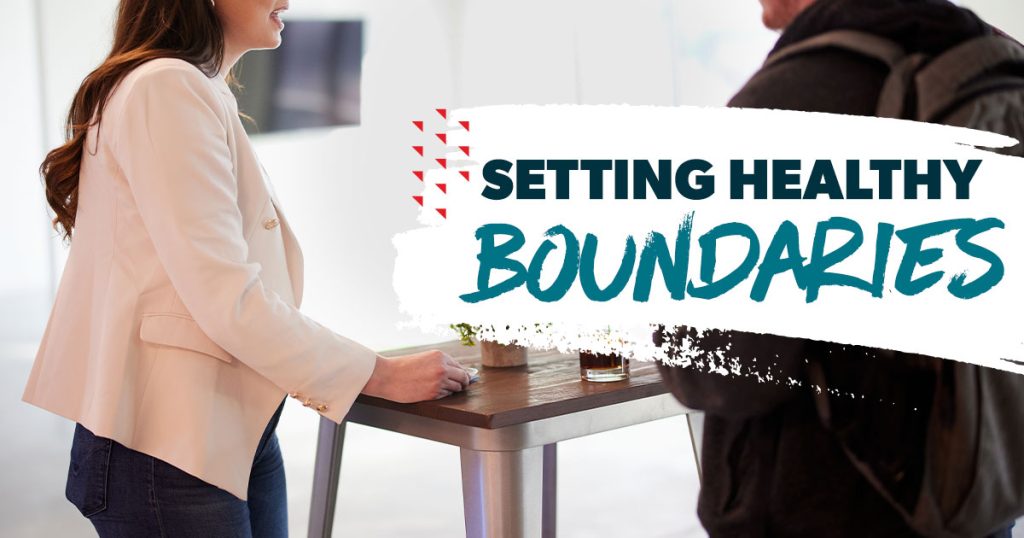I’ll come out of the gate swinging. The difference between someone who is well and whole and someone who is not can almost always be summed up in a single word: boundaries. Setting boundaries is the key to mental and relational health. Full stop.
Everyone needs healthy boundaries in their personal, relational, physical, spiritual and work lives—but most people don’t have them. Most people depend on the experiences, expectations and opinions of others to tell them what they should feel, what they owe, what they’re capable of and what they deserve.
It’s no wonder we find ourselves overcommitted, burned out and exhausted. But we don’t have to live that way. Identifying boundaries (and holding to them) will give all of us the freedom to heal, grow and live a well life.
What Are Boundaries?
My good friend Dr. Henry Cloud, psychologist and bestselling author, says, “Physical boundaries mark a visible property line that someone holds the deed to.” Property boundaries are identified by fences, flags, doors and signs. I know where my property ends and where my neighbor’s starts. I know I can’t just barge into their house, cut down their tree, or dig a hole in their yard because of the boundaries. Our personal boundaries should have the same precision and clarity.
You hold the deed to your own property line. You get to decide where your boundaries are and who has to stop once they reach the boundaries you set. Healthy boundaries are the lines marking the gap between you and me, you and your community, and you and the world at large. They protect your needs, your values, your relationships, your time, your health and your heart. They are yours to identify, yours to outline, and yours to proclaim.
Our State of Mental Health study showed that 90% of Americans believe taking care of their mental health is important, and on top of that, 56% are concerned about their mental health right now. Being well takes work. And setting boundaries is a great step toward creating a more whole and healed self.
Types of Boundaries
As adults, we have a responsibility to set the firm and healthy boundaries in our lives. Not our parents. Not our in-laws. Not our bosses or our exes. The responsibility lies with us. And most boundaries can be broken down into the following areas:
- Relational boundaries. The wants, needs and values we hold for being in relationships with others.
- Emotional boundaries. The lines that hold our psychological and emotional safety.
- Physical boundaries. The lines protecting our bodies, privacy, physical safety or personal space.
- Intellectual boundaries. The limits of what we know, what we’re interested in pursuing and how we wrestle with beliefs, opinions and values that differ from our own.
And of course, we could add many more categories here. But let’s pause and shift our focus to unpacking how healthy boundaries protect us and keep us well and whole.
Benefits of Setting Boundaries
Boundaries keep you safe.
Stop signs keep cars from colliding. Drawing the line at never borrowing money will keep you out of debt. Not tolerating physical or emotional abuse—because you’re worth being safe and secure in your relationships—gives you direction when you know it’s time to end harmful relationships. Boundaries keep us physically and relationally safe, as well as on the same page with those in our ecosystem.
Want to build a non-anxious life? Learn how in Dr. John Delony’s new book.
But just because boundaries exist to help keep us safe and well, things can still go sideways. When setting boundaries, especially with loved ones or family, expect to feel anxious or frightened. Expect people around you to get upset and try to convince you that your boundaries are dumb and irresponsible. People will violate your boundaries, and you can still end up hurt. But in these cases, boundaries serve as an anchor point for healing. For how others can help you. For what comes next. This part is hard—but it’s right. Lean into the discomfort.
Boundaries give you peace and freedom.
It sounds counterintuitive, but boundaries can give you peace. They help you sleep. They help you stay disciplined and safe. They provide space for you to be patient, kind and clear when making decisions. They help define things you can control and things you can’t.
When you give yourself permission to not carry other people’s problems, drama, emotional baggage or unrealistic expectations—you experience freedom. You realize you’re only responsible for your own feelings. You don’t have to take on everyone else’s load. When you choose to not accept toxicity or abuse, you have less relational poison flowing through your veins.
Boundaries allow you to focus and take ownership of the only person in the world you can actually change: you.
Boundaries help you grow.
Saying no is the worst. Standing up for yourself can be really uncomfortable. Being assertive can feel aggressive. But guess what? These moments of discomfort can be moments of growth and strength building. If you identify your boundaries—what you need, what you’ll tolerate and what helps you be your best—and then do the hard work of holding to them when they’re challenged, you’ll develop strength and personal power you never knew you were capable of.
Signs It’s Time to Set Healthy Boundaries
All right, so maybe you’ve gotten this far and are thinking, Boundaries sound like a good thing, but how do I know I need them in my life? Hey, I get it, folks. Setting boundaries can be weird, and you may not even be sure you need boundaries in your life. (Hint: You do.) So let’s walk through some signs that it’s time to set boundaries.
- You have trouble saying no.
- You feel resentment.
- You feel like you’re being taken advantage of.
- You have anxiety being around others.
- You get really involved in other people’s issues.
- You overshare with others.
- You want to please people.
- You’re afraid of rejection.
How to Set Boundaries
Each and every one of us can get better at creating, implementing, and holding to our boundaries. Those boundaries could be around our time, money, friendships, romantic relationships, work, abuse, safety, kids, or those neighbors who keep blaring old ’90s country during all hours of the night. But take a deep breath—these seven steps will walk you through how to set the necessary boundaries in your life.
1. Decide what you need.
Safety? Space? Work that matters? Knowing what you need will help you set the right kind of healthy boundaries. Maybe you need a healthy relationship or better connection with your kids. Maybe it’s time to respectfully tell your dad he can’t show up at your house every weekend without telling you. Or maybe you just need space in the morning to work out, meditate, and journal before the day starts. Once you identify your needs, write them down so you can see them. Setting boundaries begins here.
2. Use “I” statements.
When you internalize and communicate your new boundaries, both to yourself and others, use “I” statements. Own what you need. Own how you’ll allow others to treat you. Own how you’ll take care of yourself. Boundaries are about you, not others. Boundaries are about stating what you need and what you will (or will no longer) tolerate—and not about revenge or getting even. Using “I” statements allows you to express yourself and how you feel (aka get it off your chest), without hurting or attacking the person.
Here’s how this looks in real life:
“Hey, Mom. Chris and I have some very firm boundaries regarding the kids and technology. Chris and I have chosen to not allow them to have cell phones or video games until they’re older. I thought I was clear when we discussed the Christmas presents you wanted to buy them and how we wouldn’t allow them to have iPhones, but you bought them anyway. I feel disrespected, but I will also own the lack of clarity. I appreciate that you love my kids, but I’m not allowing them to keep or use the phones. You’re free to take them back and get them another gift that’s not screen or tech related, or you can just hang on to them. In the future, please know that Chris and I will continue to not allow our kids to own or use tech devices.”
3. Decide who you’ll allow to hurt your feelings.
Here’s a hard truth: You get to decide who hurts your feelings. People can take away your livelihood, curse you, demean you, and run you down. But you get to decide who you’ll listen to and how you’ll respond.
At different seasons in my own life, I’ve allowed students, parents, family members, employers, old friends, neighbors and countless others all to have space in my head and heart. I let them in, and I absorbed their criticism, opinions and complaints. I gave away my power, needs and wants to everyone else. I had no boundaries.
So . . . I took ownership of my thoughts, actions and relationships. I chose to stop allowing anyone and everyone to speak into my life. Ultimately, I landed on only six people who I would give permission to hurt my feelings—six people I love, trust and listen to. Of course, I still hear the opinions and thoughts of others, and I often listen and think deeply on their ideas and wishes. But I haven’t given them access to my heart or to my soul.
4. Say no.
Most of us grew up believing the word no is a bad word. A selfish word. A word for rude or unhelpful people. A weapon. This is a lie.
The word no is your best friend. It’s a gift to both you and others. The word no lets you take ownership and control of your relationships and your environment. It lets others know what you’re willing and unwilling to do. And make no mistake, the word no will make others annoyed, make them mad, or make them uncomfortable. But you’re not responsible for other people’s reactions to your boundaries. They are. So make the word no a regular part of your vocabulary. Say it clearly and proudly. Own it.
5. Practice and be consistent with your boundaries.
Like everything else in life, you aren’t going to be a pro at this right away. Setting boundaries and making them stick takes practice. So be consistent with your healthy boundaries. Practice saying no. Practice using “I” statements. Practice not letting everyone’s opinions determine your outlook or actions. Practice turning off your devices and responding to electronic communication only when you want to. And practice sticking to your boundaries too—no matter how many different times your neighbor or brother or aunt keeps ignoring them. The hope is that with time, they’ll begin to trust you as the expert of your life. And they’ll learn to respect your boundaries too.
6. Choose guilt over resentment (and get ready to be uncomfortable).
A great place to start when setting boundaries and developing inner strength is to choose guilt over resentment. It’s a powerful way to reclaim your life. Choose the guilty feeling in the pit of your stomach instead of living with building anxiety, frustration and resentment. Choose to feel guilty for saying no to your mother-in-law’s holiday plans instead of attending anyway and dragging yourself and everyone else down the entire time.
When someone challenges your boundaries, there will be discomfort. Frustration. Annoyance. Downright anger. When you set boundaries, expect people to bang their fists against them. Prepare to feel guilty and uncomfortable when you begin to stand your ground. But remember, it’s better to feel guilty about honoring yourself and your needs than to go along with those who are hurting you and live in resentment. Guilt won’t kill you—resentment will.
7. You can’t do this alone.
Life wasn’t meant to be done alone. Remember the six people I trust with my heart and soul? I rely on them to help me imagine new boundaries, reconsider old boundaries, and uphold existing boundaries. Sometimes I even need to talk with a professional coach or mental health professional. A counselor or therapist can help you make sense of your past and present relationships, help you find new boundaries for your future relationships, and help you unpack the burdens and traumas you carry from your past.
If You’re Ready to Be Well, Start Setting Boundaries
The great thing about boundaries is, you can decide to set them right now and watch them play out in your life today. If you want to be well, setting boundaries is a key piece of the puzzle. The truth is, being whole and well is something you can achieve. I unpack this more in my new book, Building a Non-Anxious Life. When you start reading, you’ll discover how to live a more peaceful, joyful life. You’re worth being well! Here are some ways to get started being well:
Read the full article here












